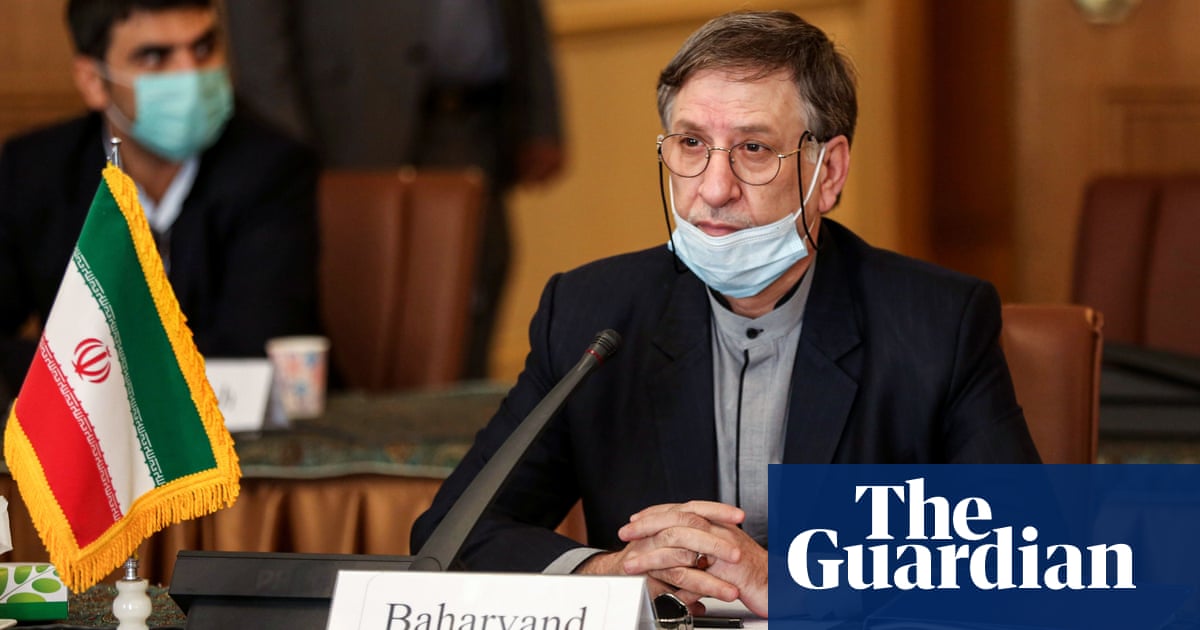
Show caption Mohsen Baharvand took up his London posting last July after a change in leadership of the Iranian foreign ministry. Photograph: Atta Kenare/AFP/Getty Images Iran Iranian ambassador to UK removed from post over hijab incident Mohsen Baharvand ordered back to Tehran after video shows some women with heads uncovered at embassy reception Patrick Wintour Diplomatic editor Sun 27 Feb 2022 12.01 GMT Share on Facebook
Share on Twitter
Share via Email
The Iranian ambassador to the UK has been ordered back to Tehran and is to be removed from his post after a video circulated showing an embassy reception at which some women did not have their heads covered.
News of Mohsen Baharvand’s return to Tehran was reported by the ILNA news agency in Iran.
At the event commemorating the 43rd Iranian Revolution, a woman playing a piano alongside a violinist was not wearing a hijab. Another video of the event showed a more conventional gathering at which speeches were given.
An Iranian in London tweeted a video of the event, attended largely by diplomats, asking whether the party would “with the presence of these people have the slightest benefit for the Iranian people?”. He later tweeted: “It is gratifying that our voice was heard in Iran. Please send an ambassador to London who is pragmatic and worthy of serving Iran and working only for the benefit of the Iranian people.”
The news circulated first in pro-regime newspapers, and some claimed it was part of a wider reorganisation of the Iranian diplomatic service being carried out by the new more hardline government led by Ebrahim Raisi, elected last June.
Baharvand was appointed by the foreign ministry before the presidential elections, but took up his London posting in July after the change in leadership of the department. He was previously the deputy head of the legal department in Iran under Mohammad Javad Zarif, the former foreign minister.
In his dealings with reporters in the UK, the ambassador did not stray from the official government position on the Iran nuclear talks, but tried to explain the context of Iranian thinking.
His departure comes at a critical time in British-Iranian relations. Iran is on the cusp of deciding whether to accept Washington’s terms for a US return to the Iran nuclear deal, including the lifting of many sanctions. Alongside the nuclear talks, Britain is seeking to secure the release of three British-Iranian dual nationals detained in Iran.
The Islamic Consultative Assembly, Iran’s parliament, met in private session on Sunday to review the state of the talks that many say could finally reach a conclusion this week. Ali Bagheri, the Iranian chief negotiator, is due to return on Sunday to Vienna, where the Iran talks are taking place, with fresh final instructions. Hossein Amir-Abdollahian, Iran’s foreign minister, is to meet Iran’s supreme national security council on Monday, and there is talk of a special session of Iran’s parliament on Tuesday.
The foreign minister said the talks were continuing, stressing nothing was agreed until everything was agreed. Issues remain around assurances on the US’s long-term commitment to the deal, and the extent of sanction suspension.
Both sides seem to be trying to prevent the fallout from Russia’s invasion of Ukraine to spill into the critical last days of the Vienna talks.
Russia has, as a signatory to the Joint Comprehensive Plan of Action – the technical term for the 2015 deal – acted as a key mediator in the months-long talks in Vienna between European powers, the US and Iran. The Russian ambassador in Vienna, Mikhail Ulyanov, has been a passionate defender of the invasion.
Opponents of the deal, not necessarily party to the negotiations, fear an agreement will give Iran leeway to become a nuclear power relatively quickly and argue that the west’s experience with Russia shows that appeasement of fundamentally hostile powers does not work, and only emboldens them.
Some Iranian political scientists have urged Iran not to be too outspoken in its support of Russia, fearing it will make it more difficult for the Biden administration to win political support for the deal. But Ali Shamkhani, the secretary of Iran’s supreme national security council, said the war was the direct responsibility of the west’s drive to threaten the security of other countries.
Amir-Abdollahian has also criticised Nato provocations without endorsing the violence. Iran takes the view that the era of cold war blocs is over, and America is in long-term decline, but that it is important for Iran to steer an independent course and not become a client of China.








